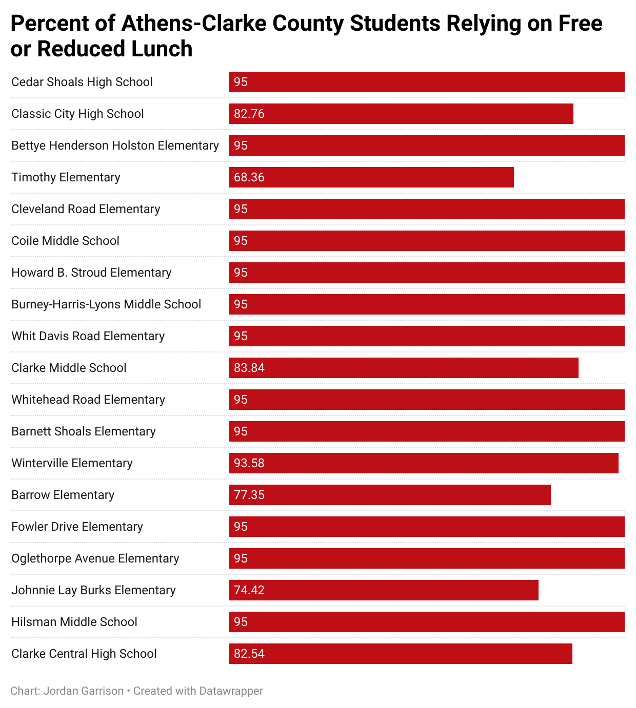About 60% of Athens-Clarke County students rely on free or reduced school meals, a vital lifeline that could be at risk as federal food assistance programs face drastic cuts in the new federal budget and the impact of the government shutdown.
Earlier this year, Congress passed legislation reducing federal support for the Supplemental Nutrition Assistance Program (SNAP) and ending the $660 million Local Food for Schools initiative, which helped schools purchase fresh food from local farms. These cuts in funding will disproportionately harm low-income communities like Athens, where many families already live below the poverty line.
SNAP benefits are also about to run out completely due to the federal government shutdown. The USDA, which administers the program, posted a message on it’s website Oct. 27 that said, “the well has run dry,” and that no benefits will issued Nov. 1.
Why It’s Newsworthy: If the state of Georgia does not step up to cover the costs of SNAP benefits, many families in Athens will face food insecurity as the holidays approach.“When children come to school hungry, it affects their ability to learn, focus and grow,” said Hillary Savage, executive director of school nutrition for the Clarke County School District. “We’re preparing for difficult decisions if state or local funds don’t make up the difference.”
Food Insecurity Looms for Many
Athens is already one of Georgia’s most food-insecure communities. According to the U.S. Census Bureau, nearly a quarter of Athens-Clarke County residents live below the poverty line — almost double the state rate. In the past, the Athens Housing Authority provided approximately 48,000 summer meals to children when school is out. The program was taken over by the Clarke County School District in 2019, but this safety net may not be sufficient once federal resources are reduced. By 2028, Georgia will be responsible for covering 5% of SNAP benefits — a projected $162 million cost that state officials have yet to address.

“If federal cuts move forward, we’ll see greater food insecurity across the state,” said Ife Finch Floyd, director of economic justice at the Georgia Budget & Police Institute. “Children will be among the first to feel it.”
Athens residents are already bracing for the impact.
“It’s heartbreaking,” said local parent Maya Thompson, whose two children rely on the school lunch program.
If the funding goes away, I honestly don’t know how we’ll keep food on the table.”
Scrambling to Meet Demand
Local nonprofits such as the Athens Community Council on Aging and Food Bank of Northeast Georgia have expanded their services in recent years, but organizers say they can’t replace the scale of federal nutrition programs. Many rely on grants, now facing cuts.
For now, local school officials continue to advocate for state support while preparing contingency plans. Savage said her department is exploring partnerships with area farms and nonprofits to maintain consistent access to healthy food.
Jordan Garrison is a fourth-year student majoring in journalism with a political science minor.







Show Comments (1)
J Smith
Unless it’s a very recent change, I don’t think the Housing Authority runs a summer lunch program any longer.